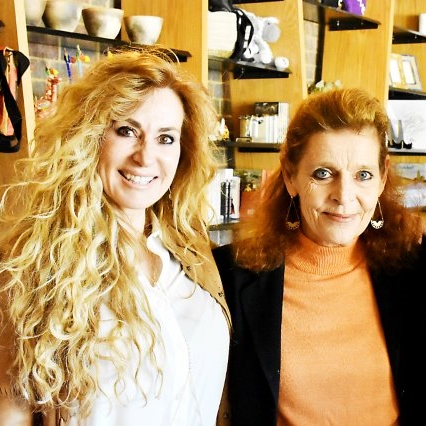click to dowload our latest edition
CLICK HERE TO SUBSCRIBE TO OUR NEWSLETTER


Published
6 years agoon
By
adminNICOLA MILTZ
Sklaar joined her mentor, therapist and co-author Sue Hickey, in conversation on domestic abuse at Issy’s Coffee & Gift Shop at the Johannesburg Holocaust & Genocide Centre in Forest Town last week.
The two co-authored When Loving Him Hurts, which deals with how to recover from an abusive relationship, and The Affair, about how to recover from illicit sex, lies and betrayal.
It took three abusive marriages – one of them to former Primedia Broadcasting CEO and Radio 702 host Stan Katz – for Sklaar to finally understand that she was the common denominator in all three failed relationships. “Until I took responsibility for my contribution to the dance of abuse, I was destined to repeat the pattern,” she said.
True healing began “when I became my project”, she told the intimate group of women present.
Sklaar, who cut a striking figure in leopard-print trousers and with her trademark blonde mane, said that by telling her story, she hoped to help lift the veil of shame of abuse and encourage other women to do the same.
“I’m not ashamed. I wear it like a badge of honour. Abuse has given me direction and has taught me the power of choice. I have found my passion,” said Sklaar who, after years of healing, has formed a non-profit organisation called The Women’s Voice Project.
You can hardly imagine a more incongruous sight than that of the glamorous Sklaar in the prison yard of the California Institution for Women (CIW), a state prison for women located in the city of Chino, San Bernardino County, in California, east of Los Angeles. This is where she trains women on domestic abuse survival skills.
“It’s exactly as you see in the movies,” said Sklaar, who lives in LA. “Women with tattoos down their faces, walking hand in hand some of them, looking very rough and tough.”
It is here that Sklaar gives her first-hand account of domestic violence and abuse. She runs self-help courses aimed at rehabilitating these prisoners, all of whom have murdered their partners following years of abuse.
“I love these women. They only know lives of abuse. Their stories are unbelievable; they are remarkable,” she said. She writes letters of recommendation on completion of her course for when they go before the parole board.
“If these women can get it and transform, then anybody can,” said Sklaar, who claims abuse has changed her life.
“Abuse gave me my life purpose. I get to go out every day and help make a difference in people’s lives. It was how I discovered my worth,” she said.
Sklaar and relationship expert Hickey described how the two came to write their first book, When Loving Him Hurts, in 2015. They combined Hickey’s sound theoretical knowledge with Sklaar’s first-hand experiences in a self-help book on abuse and how to survive it. The book contains a Bully Barometer Checklist in which to evaluate whether your relationship qualifies as abusive.
“Many people think they are in an abusive relationship,” said Hickey. “Most of the time it is an unhappy relationship or a lousy, hurtful relationship.”
They need to tick 12 out of 16 points on the bully barometer before they can say their relationship qualifies as abusive, said Hickey.
The barometer lists as likely indicators things like constant criticism of you, your friends and family; constantly blaming you for his problems; ridiculing you; undermining your relationships; flirting with your friends; accusing you of flirting with his friends; demanding sex; withholding sex; threatening to leave you; and controlling finances.
“It took years before I accepted that I was an abused woman. It seemed impossible that I could be one or that my husband was an abuser. He was too rich, too educated and too sophisticated. I was the mayor’s daughter and was far too affluent to be a victim of abuse,” said Sklaar.
She has since realised that abuse can happen to anyone, anywhere, anytime.
“My opinion changed dramatically one night when I found myself on the pavement bleeding, my clothes torn. He had tried to put a cigar out on my cheek, bit my mouth until it filled with blood, and tried to choke me. I managed to break free and ran out of the house,” she recalled.
Most abused women are co-dependants, said Hickey and Sklaar. They equate love with need, and unless they are working like a slave for a man, their love isn’t worth anything. “Our pathology demands damaged, wounded men to prove we can save them,” said Sklaar.
“There is always a payoff to self-destructive behaviour, and for me, it was that as long as I blamed them, I didn’t have to take responsibility for my life. There is nothing more disempowering than being a victim.”
She added: “I read every self-help book, attended Kabbalah classes and even went to an ashram in India in search of answers. Slowly and painstakingly, my search moved from outside to within, and a new value system emerged. Everything I had thought was valuable became insignificant and everything I believed was true, wasn’t.”
Thanking Hickey for all she has learnt along the road to recovery, Sklaar ended by saying: “Abuse taught me the power of choice. I get to choose what thoughts I want, what feelings I want, and who I want in my life. No one can rob me of my inner peace unless I choose to allow it.”
